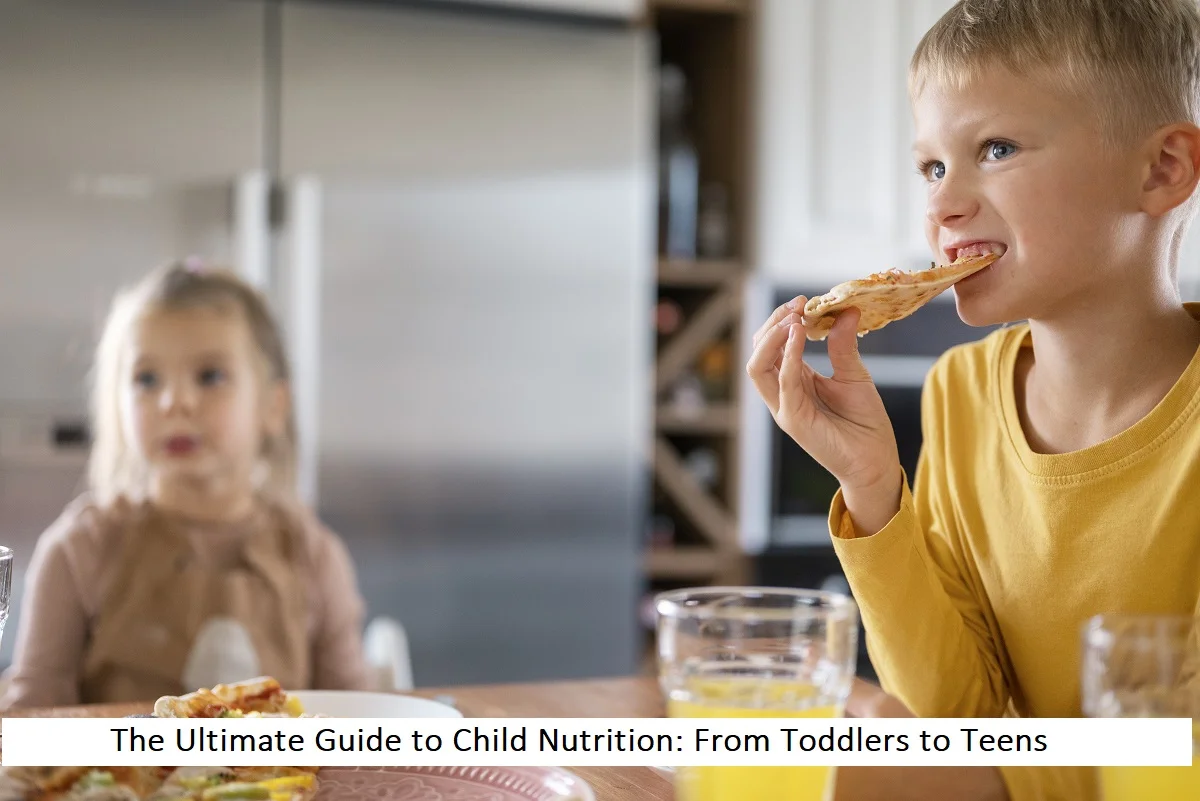Proper nutrition is the cornerstone of a child’s growth, development, and overall health. Whether you’re raising a toddler or a teenager, understanding their nutritional needs is key. This ultimate guide to child nutrition covers everything you need to know to ensure your child thrives at every stage. From nutrient-rich foods to meal planning tips, we’ve got you covered. Plus, we’ll answer common questions and provide actionable advice to make healthy eating a breeze.
Nutrition for Toddlers (1-3 Years)
Toddlers are in a critical stage of rapid growth and development. Our guide to child nutrition emphasizes nutrient-dense foods that support brain development, bone growth, and immune health.
Key Nutrients for Toddlers:
- Healthy Fats: Essential for brain development. Include avocados, nut butters, and olive oil.
- Iron: Supports cognitive development. Found in lean meats, beans, and fortified cereals.
- Calcium and Vitamin D: Crucial for bone health. Offer dairy products, fortified plant-based milk, and leafy greens.
Meal Ideas for Toddlers:
- Breakfast: Scrambled eggs with avocado slices and whole-grain toast.
- Lunch: Sweet potato mash with grilled chicken and steamed broccoli.
- Snack: Greek yogurt with blueberries and a drizzle of honey.
Tips for Picky Eaters:
- Offer small portions to avoid overwhelming your toddler.
- Make meals fun by arranging food into shapes or using colorful plates.
- Be patient—it can take multiple tries for a child to accept a new food.
Pro Tip: For more toddler-specific food ideas, check out our article on Top 5 Nutrient-Rich Foods for Toddlers: A Parent’s Guide.
Nutrition for School-Aged Kids (4-12 Years)
School-aged kids need a mix of nutrients to support physical activity, cognitive development, and overall growth.
Key Nutrients for School-Aged Kids:
- Protein: Supports muscle growth and repair. Include lean meats, eggs, beans, and tofu.
- Fiber: Aids digestion and keeps kids full. Found in whole grains, fruits, and vegetables.
- Calcium and Vitamin D: Essential for strong bones. Offer milk, cheese, yogurt, and fortified cereals.
Meal Ideas for School-Aged Kids:
- Breakfast: Whole-grain pancakes with fresh fruit and a glass of milk.
- Lunch: Turkey and cheese wrap with baby carrots and hummus.
- Snack: Apple slices with almond butter.
Encouraging Healthy Habits:
- Involve kids in meal planning and preparation.
- Limit sugary snacks and drinks to prevent energy crashes.
- Encourage family meals to promote healthy eating habits.
Did You Know? Kids who eat breakfast perform better academically and have improved concentration.
Nutrition for Teenagers (13-18 Years)
Teens experience rapid growth and hormonal changes, making nutrition crucial for their physical and mental well-being.
Key Nutrients for Teens:
- Protein: Supports muscle development during growth spurts. Include lean meats, eggs, and plant-based proteins.
- Iron: Especially important for teenage girls to prevent anemia. Found in red meat, spinach, and fortified cereals.
- Healthy Fats: Essential for brain health. Include nuts, seeds, and fatty fish like salmon.
Meal Ideas for Teens:
- Breakfast: Smoothie with Greek yogurt, spinach, banana, and chia seeds.
- Lunch: Grilled chicken salad with quinoa, avocado, and a variety of veggies.
- Snack: Trail mix with nuts, seeds, and dried fruit.
Tips for Busy Teens:
- Plan ahead with healthy snacks like nuts, fruit, and yogurt.
- Avoid skipping meals, especially breakfast.
- Limit fast food and sugary drinks.
Pro Tip: For more tips on teen nutrition, check out our article on Healthy Meal Plans for Kids in Childcare Settings.
Common Nutritional Challenges
1. Picky Eating:
- Offer a variety of foods and involve kids in meal prep.
- Avoid pressuring your child to eat—make mealtime fun and stress-free.
2. Food Allergies:
- Be mindful of allergens and find suitable alternatives.
- Always read food labels and communicate with schools or caregivers.
3. Busy Schedules:
- Plan ahead with healthy snacks and meals.
- Use batch cooking to save time during the week.
Conclusion
Child nutrition is not one-size-fits-all. By understanding the unique needs of toddlers, school-aged kids, and teens, you can create a balanced diet that supports their growth and development. This guide to child nutrition will help you start small, stay consistent, and lead by example to instill lifelong healthy eating habits. For more specific advice, explore our guide on Top 5 Nutrient-Rich Foods for Toddlers .
FAQs About Child Nutrition
Focus on a varied diet rich in fruits, vegetables, whole grains, and lean proteins. Consider a multivitamin if recommended by your pediatrician.
Opt for nutrient-dense snacks like fruit, nuts, yogurt, and whole-grain crackers.
Be patient, offer new foods alongside familiar favorites, and avoid pressuring your child to eat.
Children should generally drink 6–8 cups of water daily, depending on their age, activity level, and weather. Encourage water instead of sugary drinks to keep them hydrated and healthy.
Homemade meals usually contain fewer additives, preservatives, and added sugars. Preparing fresh meals at home helps you control portion sizes and ensure your child gets balanced nutrition.
Key vitamins include vitamin D for bones, vitamin C for immunity, and B vitamins for energy. Iron, calcium, and omega-3 fatty acids also play vital roles in growth and brain development.




